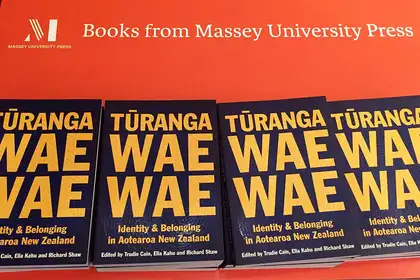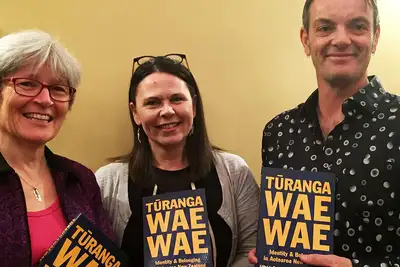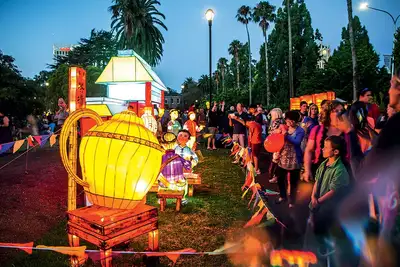
'Turangawaewae' on display at last week's launch.
A new book about what it means to be in or of New Zealand in the 21st century has resonated across workplaces and dinner tables, according to students who are studying it.
Titled Tūrangawaewae: Identity and Belonging in Aotearoa New Zealand, (Massey University Press) the book was written as the text for a core paper in Massey’s recently revamped Bachelor of Arts degree. The new core papers aim to provide a coherent thematic structure based to a degree with abundant offerings from the humanities and social sciences, and to ask of readers: 'Who are we?'
It spans the myths and legacies of All Blacks and Anzacs and explores the impact of Kapa Haka, Pasifika festivals, gay pride, the boom of ethnic eateries and events generated by an increasingly diverse population – all reflecting the range of influences on how we define and express our New Zealand-ness.
Its authors say the book on our evolving identity and culture has triggered a range of comments from students (aged 18 to 65 and doing the paper internally or by distance). Feedback has included comments such as: “this stuff you’re teaching us – how did I not know this?’ Why didn’t they teach me this at school?’” says one of the book’s editors and contributing writer, Dr Ella Kahu. Students have also been discussing issues from the book at home around the dinner table and at workplaces, they tell her.
Many say they now see things differently as a result of learning for the first time about key historical events, including the 1952 Waterfront Strike, 1970s Bastion Point protests and Dawn Raids in the 1970s and 1980s, as well as critically examining concepts such as our bi-cultural history, gender equality and neo-liberalism.

Co-editors and contributing writers Dr Ella Kahu, Dr Trudie Cain and Professor Richard Shaw.
New lens on life in Aotearoa
Publisher Nicola Legat and editors Professor Richard Shaw, Dr Trudie Cain and Dr Kahu believe the book offers a richness of ideas, stories and guiding information on the complexities of our past and present that makes compelling reading for anyone – not just BA students.
Its design makes it intellectually and visually appealing and accessible, with chapters embellished with photos, art, news clippings, quotes, poems and QR codes that link to additional reading and relevant websites, YouTube videos and Ted talks, as well as standard reading lists.
The book’s conceptual framework is built around four central themes – faces, voices, places and stories – and underpinned by the Māori meaning of Tūrangawaewae: place of belonging where you draw your strength from, your ‘standing place’. Sub-sections have been written by academics across the disciplines at Massey’s College of Humanities and Social Sciences.
The Faces of Aotearoa New Zealand section traverses demographic diversity, and Māori identity and belonging. In part two, Voices, Professor Shaw examines political representation and participation, while Dr Kahu looks at participation and protest in public life and Dr Cain explores how people express themselves through the arts.
In the third section, Places, a range of social scientists investigate physical, institutional (including, critically, the role of universities) and digital places to illuminate the meanings around the idea of of ‘home’. This includes how new residents incorporate a sense of the place they’ve come from to their adopted location, Māori notions of connection to land through ancestral roots, social conventions around the desirability of home ownership and why we have so many homeless.
Section four, Stories, analyses the stories that we tell about our nation, including that we are an egalitarian society with a clean, green environment, as well as the powerful contribution of the Anzac story to our nation building.

Auckland's annual Lantern Festival to celebrate the Chinese New Year (photo/Auckland Tourism, Events & Economic Development).
Navigating a post-Brexit and Trump world
Of relevance to readers everywhere, Turangawaewae asks: What is a New Zealander? What does it mean to be a citizen of or a resident in this country? How do we understand what makes New Zealand complex, and unique? And what creates a sense of belonging and identity, both here and in the world?
In their introduction, the editors say that: “Now’s a critical time to be thinking about these sorts of things. In a post-Trump, post-Brexit world, easy slogans have taken the place of reasoning and reasonableness, empathy is in retreat, and intolerance is on the march. History tells us that this is never a good mix.
“We think the book will give anyone who reads it cause to pause and think about what it means to be in this place and at this time. Who we are as New Zealanders, what we look like, the ways in which we live our lives— these are all changing rapidly and in fundamental ways.
“Simultaneously, internationally we’re living through a tumultuous period in history during which things many of us have long taken for granted are being questioned. We’d like to think that some of the intellectual tools the book provides will help people navigate through and make sense of these developments.”
They hope readers, whether currently at university or not, will gain insights from the book including:
- An appreciation of the complexity of Aotearoa New Zealand’s history and its influence on where we are today
- An appreciation of multiple perspectives about any given issue
- A willingness to be reflexive and examine their own perspectives and assumptions about Aotearoa
Click here to read a Q&A with the editors.